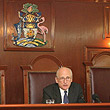| Published: Date: Updated: Author: |
The Bahamas Investor Magazine June 27, 2007 June 27, 2007 Clifford Bishop |
The Bahamas’ highest court of appeal had never even visited the country until last December. In fact, in its 170-year history, the Judicial Committee of the Privy Council had never ventured outside London before arriving in Nassau for a five-day sitting on December 18 of last year. Established in 1833 as the ultimate appeal court for what were then the colonies of the British Empire, the Committee had consistently turned down invitations from all other Commonwealth members, including Hong Kong.
Lord Bingham of Cornhill, the Senior Law Lord who heads the Committee, acknowledged that the Privy Council’s visit to The Bahamas was not merely historic, but “unprecedented.” Queen Elizabeth II sent her personal greetings and best wishes, and the welcoming ceremony at the Court of Appeal prior to the Committee’s five-day sitting was attended by the cream of The Bahamas’ legal profession, including: then Attorney General Allyson Maynard Gibson, former Attorneys General Paul Adderley, Janet Bostwick and Tennyson Wells, former Governor General Sir Orville Turnquest and president of the Bar Association, Wayne Munroe.
That the five senior British judges who comprise the Judicial Committee, Lord Bingham, Lord Brown, Lord Carswell, Baroness Hale and Lord Scott of Foscote, should sit in The Bahamas is both a tribute to and an assurance of the stability and rule of law throughout the islands. As Maynard Gibson noted in welcoming the visitors, the knowledge that litigants in The Bahamas ultimately have access to the Privy Council “undergirds the confidence that has been displayed nationally and internationally in our country.”
Learned friends
The presence of the Committee was thanks, in large part, to ex-Chief Justice and current president of the Court of Appeal, Dame Joan Sawyer. Herself a Privy Councillor, who took her oath before the Queen in 2005, Dame Joan has been instrumental in persuading some of the most senior law lords to visit The Bahamas individually, to address the Bar Association and enjoy the local climate.
Lord Scott was here in 2005, and Lord Bingham the year before, giving a seminar entitled The Impact of Judicial Decisions on the Economy. Apparently both were eager to return. “The warmth of our welcome has been such,” said Lord Bingham, “that we are already very reluctant to sit anywhere outside of The Commonwealth of The Bahamas.”
The Privy Council derived other benefits from its visit, apart from the hospitality. Bar Association President Wayne Munroe told the law lords that their physical presence would humanize a body that could all too easily seem distant and forbidding. “It is very important for the persons who govern to see those who they are governing,” he said. “And as the apex of the third branch of government in this country, it is useful for you to be seen to be human just as the persons whose judgements you affect.”
Following some controversial rulings, among them the refusal to allow governments the right to impose a mandatory death sentence, a number of Caribbean countries, including Barbados and Guyana, have renounced their right to appeal to the Privy Council and signed up instead to the Caribbean Court of Justice that was inaugurated on April 16, 2005, in Port of Spain, Trinidad.
Addressing this issue, Lord Bingham said that any such decision would rest purely with the people of The Bahamas: “No one could stop you and no one would wish to do so.” He added, however, that “the members of the Privy Council feel greatly privileged to serve the people of these islands. It is a role which we cherish and would not for our part abandon.”
The first duty of the court, said Lord Bingham, was to interpret and apply the Constitution of The Bahamas, to ensure that “rights are protected and duties performed.” More particularly, though, it was crucial to “underwrite” wealth and prosperity by providing “that legal certainty, clarity and predictability, which are the essential pre-conditions of successful investment, commerce and finance, [and are] ever more so in a shrinking world.”









